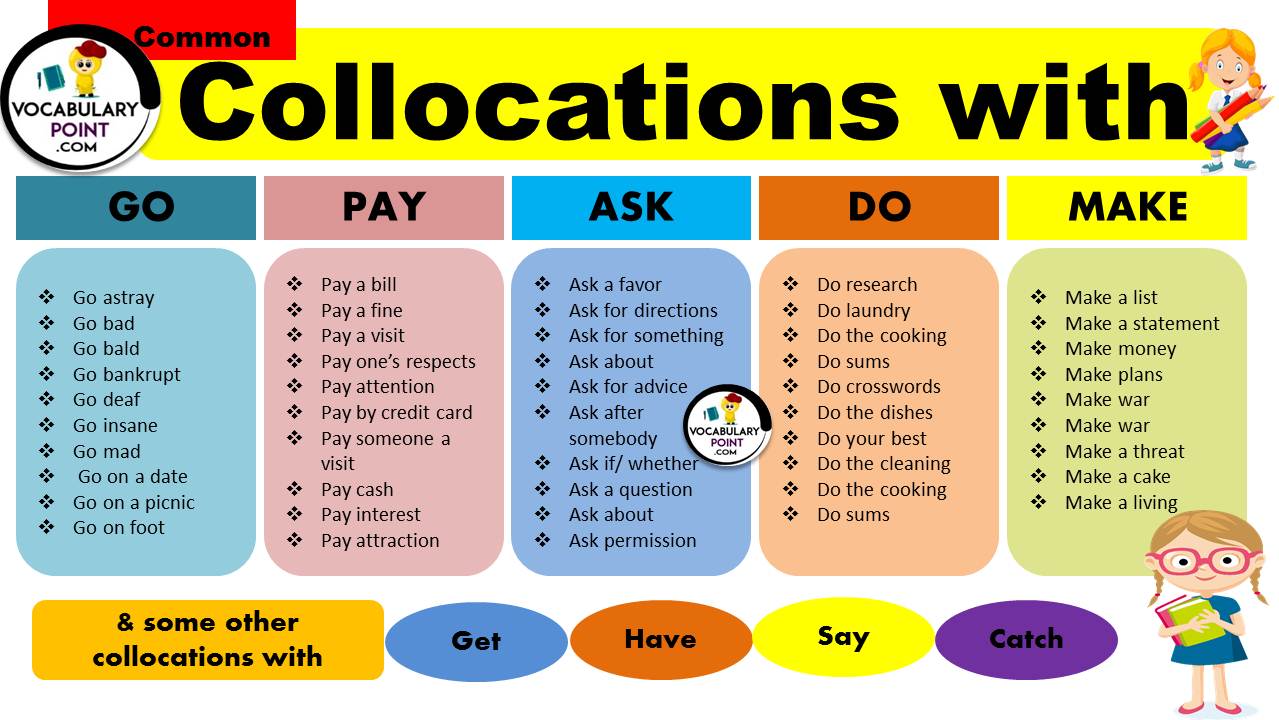In the English language, common collocations are pairs or groups of words that are often used together, creating a natural-sounding expression. These combinations, spanning various parts of speech, are integral to fluent and idiomatic English. They range from verb-noun pairs, like “take a nap,” to adjective-noun combinations, such as “bitter cold.”
What Are Collocations?
Collocations are combinations of words in a language frequently occurring together, forming natural-sounding expressions. These pairings, often instinctively used by native speakers, can include adjectives with nouns, verbs with adverbs, or verbs with nouns. For instance, “heavy rain” and “make a decision” are typical collocations.
What are collocations in grammar?
In grammar, collocations are not strictly defined by grammatical rules but are formed based on usage patterns within the language. They do not always follow a predictable grammatical structure, but they are essential for fluent and idiomatic language use. Collocations can vary in form, including adjective-noun pairs (e.g., “bitter cold”), verb-noun pairs (e.g., “commit a crime”), and adverb-verb pairs (e.g., “fully understand”).
Types Of Collocations
Collocations in English can be categorized into several types, each defined by the nature of the word pairing. Here are the primary types of collocations:
- Adjective + Noun
These collocations pair a descriptive word with a noun, providing a specific quality to the noun.
- Example: “Heavy rain”, “Strong coffee”
- Noun + Verb
This type involves a noun followed by a verb, often indicating the action typically associated with the noun.
- Example: “Dogs bark”, “Clocks tick”
- Verb + Noun
In these collocations, a verb is paired with a noun, often indicating an action typically performed on the noun.
- Example: “Make a decision”, “Play a game”
- Verb + Adverb
Here, a verb is combined with an adverb, where the adverb describes how the action of the verb is performed.
- Example: “Run quickly”, “Speak softly”
- Adverb + Adjective
These collocations consist of an adverb paired with an adjective, typically intensifying or qualifying the adjective.
- Example: “Utterly ridiculous”, “Highly unlikely”
- Noun + Noun
This type features two nouns used together, often forming a compound noun or a closely related concept.
- Example: “Traffic jam”, “Soap opera”
- Noun + Preposition + Noun / Noun + Preposition Phrase
These collocations involve a noun followed by a preposition and another noun or phrase, forming a cohesive idea.
- Example: “A cup of tea”, “In case of emergency”
- Verb + Preposition
In these collocations, a verb is paired with a specific preposition, creating a phrase with a distinct meaning.
- Example: “Agree with”, “Depend on”
Must Learn:
Common Collocations In English
- Essential
- Bitterly cold
- Blindly trust
- Broadly similar
- Calmly explain
- Carefully consider
- Clearly understand
- Closely related
- Comfortably afford
- Completely different
- Constantly changing
- Deeply regret
- Desperately need
- Eagerly await
- Easily accessible
- Effortlessly achieve
- Enormously grateful
- Entirely convinced
- Especially important
- Eternally grateful
- Evenly distribute
- Exactly right
- Exceedingly rare
- Exceptionally talented
- Exclusively reserved
- Extremely careful
- Faintly remember
- Faithfully follow
- Famously known
- Fiercely competitive
- Financially stable
- Firmly believe
- Fully understand
- Generally accept
- Genuinely interested
- Greatly appreciate
- Happily married
- Heavily influenced
- Highly recommend
- Hugely successful
- Immensely popular
- Impartially judge
- Intensely dislike
- Keenly aware
- Largely forgotten
- Legally binding
- Loudly protest
- Mentally prepare
- Mildly amusing
- Morally wrong
- Mutually beneficial
- Naturally gifted
- Nearly finished
- Officially announce
- Particularly useful
- Passionately love
- Patiently wait
- Perfectly normal
- Physically fit
- Pleasantly surprised
- Politically correct
- Poorly understood
- Positively glowing
- Potentially dangerous
- Powerfully built
- Practically impossible
- Precisely calculated
- Proudly present
- Quickly realize
- Quietly resigned
- Rapidly expanding
- Readily available
- Really enjoy
- Reasonably priced
- Recently discovered
- Regularly exercise
- Relatively easy
- Remarkably well
- Respectfully decline
- Responsibly manage
- Richly deserved
- Roughly estimate
- Sadly missed
- Safely assume
- Scarcely believe
- Seamlessly integrate
- Secretly admire
- Seriously consider
- Severely damage
- Sharply criticize
- Significantly impact
- Silently suffer
- Simply amazing
- Slightly adjust
- Slowly improve
- Smoothly transition
- Softly whisper
- Solemnly swear
- Specially designed
- Spectacularly fail
- Steadily increase
- Sternly warn
- Strongly believe
- Substantially reduce
- Suddenly appear
- Superbly crafted
- Surprisingly affordable
- Sweetly smile
- Tenderly care
- Thoughtfully consider
- Tightly grip
- Totally agree
- Tragically lost
- Tremendously exciting
- Truly remarkable
- Unanimously agree
- Undoubtedly true
- Unexpectedly find
- Uniformly apply
- Uniquely positioned
- Universally recognized
- Unquestionably superior
- Urgently request
- Vaguely remember
- Vehemently deny
- Vividly recall
- Warmly welcome
- Widely known
- Wildly popular
- Wisely choose
- Wonderfully creative
- Work tirelessly
- Worryingly low
- Yearn deeply
- Zealously defend
- Narrowly escape
- Openly discuss
- Painfully aware
- Peacefully coexist
- Playfully tease
- Positively influence
- Practically demonstrate
- Precisely measure
- Profoundly impact
- Rapidly develop
- Readily admit
- Realistically assess
- Regularly update
- Remarkably efficient
- Rigorously test
Collocations for IELTS
- Achieve success
- Break the news
- Catch a cold
- Do your best
- Earn respect
- Face a problem
- Gain experience
- Hold a meeting
- Increase awareness
- Join forces
- Keep a promise
- Launch a product
- Meet requirements
- Negotiate a deal
- Offer assistance
- Pose a question
- Reach a consensus
- Set a record
- Take action
- Undergo surgery
- Voice an opinion
- Win an award
- Exercise caution
- Yield results
- Zap energy
- Zigzag motion
- Zoom in
- X-ray vision
- Wrestle with problems
- Yearn for success
Common Collocations Examples
- Bitterly disappointed
- Deeply concerned
- Eagerly anticipated
- Fully aware
- Greatly appreciated
- Highly unlikely
- Intensely personal
- Perfectly clear
- Rapidly increasing
- Richly deserved
- Severely damaged
- Strongly believe
- Utterly ridiculous
- Widely accepted
- Absolutely necessary
- Blatantly obvious
- Completely different
- Entirely possible
- Firmly convinced
- Genuinely interested
- Hopelessly lost
- Incredibly easy
- Mildly amusing
- Painfully obvious
- Remarkably quick
- Seriously injured
- Terribly sorry
- Visibly upset
- Wildly exaggerated
- Amazingly talented
1000 English Collocations Pdf
- Break the news
- Catch a glimpse
- Do homework
- Earn a living
- Face the consequences
- Give a presentation
- Have a baby
- Keep a secret
- Make a difference
- Pay attention
- Run a business
- Set a record
- Take a break
- Use force
- Win a prize
- Avoid danger
- Blow a whistle
- Come to a decision
- Draw a conclusion
- Express gratitude
- Feel free
- Get permission
- Hold a position
- Jump to conclusions
- Lose patience
- Miss an opportunity
- Open an account
- Play a role
- Reach an agreement
- Seek advice
- Throw a party
- Understand the importance
- Waste time
- Act responsibly
- Breathe deeply
- Change the subject
- Drive carefully
- Enjoy freedom
- Find a solution
- Gain experience
- Handle a situation
- Imagine the future
- Join forces
- Learn a lesson
- Meet expectations
- Notice a difference
- Produce results
- Read a book
- Solve a problem
- Travel abroad

Collocations with Pay
“Pay” is a versatile word often used in financial and social contexts, reflecting various transactions and interactions.
- Pay attention
- Pay respect
- Pay the bill
- Pay a fine
- Pay a visit
- Pay homage
- Pay in cash
- Pay a fee
- Pay a compliment
- Pay interest
- Pay a deposit
- Pay the rent
- Pay a dividend
- Pay a premium
- Pay a penalty
- Pay in full
- Pay off debt
- Pay back
- Pay a fare
- Pay a salary
- Pay taxes
- Pay a ransom
- Pay a bribe
- Pay your share
- Pay the price
- Pay by card
- Pay a subscription
- Pay for damages
- Pay dividends
- Pay in advance
- Pay in installments
- Pay a tip
- Pay a toll
- Pay a wage
- Pay a tribute
- Pay a bonus
- Pay a surcharge
- Pay your dues
- Pay a tariff
- Pay a loan
- Pay your respects
- Pay a charge
- Pay dues
- Pay lip service
- Pay the mortgage
- Pay a fine
- Pay for repairs
- Pay the cost
- Pay a visit
- Pay a debt
Collocations with Get
Introduction: “Get” is a common verb that pairs with many words to describe acquiring, receiving, or experiencing something.
- Get ready
- Get lost
- Get a job
- Get a chance
- Get a grip
- Get a life
- Get permission
- Get a loan
- Get a ticket
- Get a degree
- Get a haircut
- Get a meal
- Get a divorce
- Get a cold
- Get a tan
- Get a clue
- Get a break
- Get a call
- Get an idea
- Get an answer
- Get a response
- Get a reaction
- Get advice
- Get help
- Get support
- Get approval
- Get going
- Get together
- Get started
- Get a reward
- Get a promotion
- Get an education
- Get a fever
- Get a headache
- Get a discount
- Get a prize
- Get a message
- Get a feeling
- Get a ride
- Get a view
- Get a glimpse
- Get a look
- Get a taste
- Get a sense
- Get a shock
- Get a surprise
- Get a kick
- Get involved
- Get married
- Get engaged
Collocations with Make
Introduction: “Make” often denotes creation, preparation, or prompting of an action, leading to diverse and dynamic phrases.
- Make a difference
- Make a decision
- Make a mistake
- Make a point
- Make a move
- Make a change
- Make a choice
- Make a plan
- Make a promise
- Make a prediction
- Make a suggestion
- Make a comment
- Make an effort
- Make an appointment
- Make a bet
- Make a call
- Make a complaint
- Make a connection
- Make a contribution
- Make a discovery
- Make a deal
- Make a fortune
- Make a friend
- Make a journey
- Make a list
- Make a meal
- Make a noise
- Make a note
- Make a payment
- Make a profit
- Make a reservation
- Make a sale
- Make a speech
- Make a statement
- Make a wish
- Make an excuse
- Make an impact
- Make an impression
- Make an income
- Make an inquiry
- Make amends
- Make peace
- Make progress
- Make sense
- Make trouble
- Make war
- Make love
- Make up
- Make out
- Make do
Collocations with Take
“Take” encompasses actions of acquiring, accepting, or embarking, often implying movement or change.
- Take a break
- Take a chance
- Take a look
- Take a trip
- Take a walk
- Take a bath
- Take a shower
- Take a nap
- Take a seat
- Take a stand
- Take a test
- Take a picture
- Take a call
- Take a decision
- Take a risk
- Take a turn
- Take a vote
- Take action
- Take advantage
- Take care
- Take charge
- Take control
- Take notes
- Take part
- Take place
- Take responsibility
- Take time
- Take up
- Take off
- Take on
- Take over
- Take back
- Take sides
- Take leave
- Take a hint
- Take a message
- Take a bow
- Take a course
- Take a hit
- Take a leap
- Take a pledge
- Take a guess
- Take a swing
- Take a dive
- Take a stand
- Take a bite
- Take a sip
- Take a cut
- Take a view
- Take a survey
Collocations with Have
“Have” is a foundational verb in English, used to express possession, experience, or the necessity of an action.
- Have a look
- Have a go
- Have a drink
- Have a meal
- Have a rest
- Have a bath
- Have a chat
- Have a break
- Have a laugh
- Have a cry
- Have a think
- Have a problem
- Have a question
- Have a suggestion
- Have a plan
- Have a dream
- Have a nightmare
- Have a feeling
- Have a headache
- Have a cold
- Have a fever
- Have a chance
- Have a choice
- Have a baby
- Have a child
- Have a family
- Have a pet
- Have a car
- Have a house
- Have a job
- Have a hobby
- Have a passion
- Have a skill
- Have a talent
- Have a friend
- Have a partner
- Have a relationship
- Have a meeting
- Have a party
- Have a dinner
- Have a lunch
- Have a snack
- Have a coffee
- Have a tea
- Have a beer
- Have a wine
- Have a cocktail
- Have a vacation
- Have a holiday
- Have a trip
- Have an adventure
Collocations with Prepositions
Prepositions connect words, creating phrases that specify time, location, direction, or relationship between elements.
- In time
- On time
- At risk
- In love
- With respect
- By chance
- For sale
- On sale
- At work
- In progress
- With care
- By hand
- For fun
- On purpose
- At peace
- In pieces
- With passion
- By accident
- For good
- On demand
- At a loss
- In demand
- With ease
- By design
- For a reason
- On a journey
- At a standstill
- In a hurry
- With enthusiasm
- By the book
- For a change
- On a budget
- At a glance
- In a mess
- With confidence
- By the sea
- For a while
- On a roll
- At a crossroads
- In a dilemma
- With gratitude
- By surprise
- For the best
- On a mission
- At an advantage
- In a bind
- With permission
- By choice
- For a cause
- On a quest
- At a distance
Collocations with DO
“Do” is a fundamental verb in English, often used to describe actions, tasks, and activities in various contexts.
- Do the dishes
- Do your best
- Do homework
- Do a job
- Do a favor
- Do the laundry
- Do business
- Do exercise
- Do a task
- Do research
- Do a project
- Do harm
- Do good
- Do damage
- Do a dance
- Do a test
- Do an experiment
- Do a trial
- Do the shopping
- Do the cooking
- Do the cleaning
- Do a presentation
- Do a performance
- Do a service
- Do a duty
- Do a trick
- Do a workout
- Do yoga
- Do a marathon
- Do a puzzle
- Do a crossword
- Do math
- Do a calculation
- Do an analysis
- Do a review
- Do a report
- Do an assignment
- Do paperwork
- Do a survey
- Do a study
- Do a practice
- Do an exercise
- Do a routine
- Do a ritual
- Do a ceremony
- Do a celebration
- Do a festival
- Do a competition
- Do a race
- Do a game

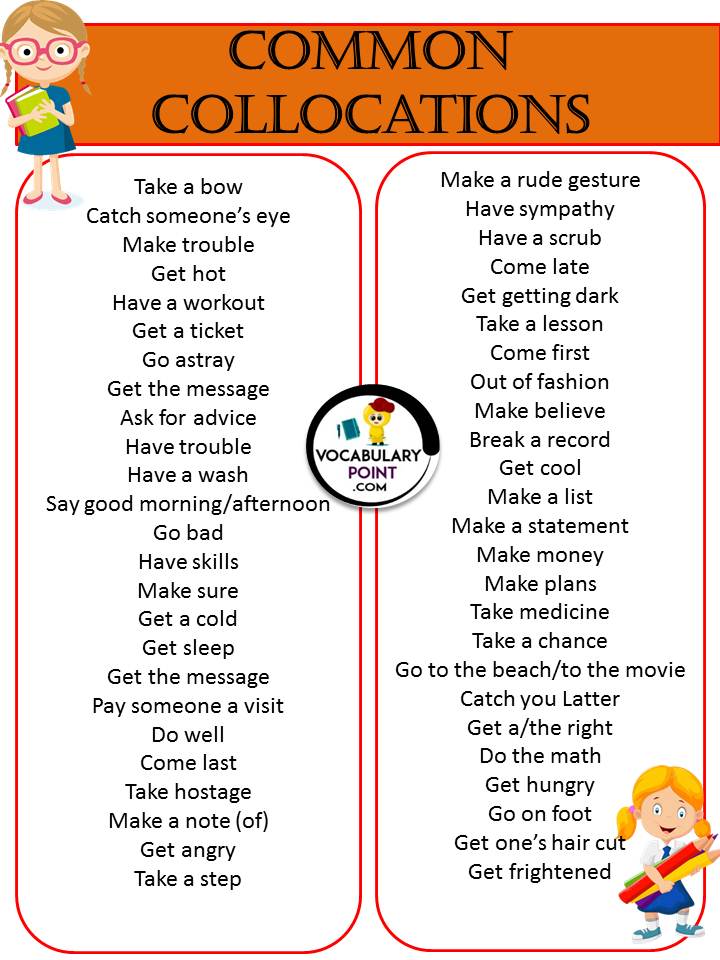
List of collocations
- Break the news
- Catch a cold
- Make a decision
- Do homework
- Pay attention
- Save time
- Keep a secret
- Take a chance
- Give a speech
- Have a snack
- Join forces
- Set a record
- Lead a team
- Follow instructions
- Run a marathon
- Write a report
- Read a book
- Climb a mountain
- Play a game
- Watch a movie
- Cook dinner
- Wash dishes
- Sweep the floor
- Paint a picture
- Sing a song
- Dance a jig
- Jump a hurdle
- Lift weights
- Build a house
- Drive a car
- Fly a kite
- Swim laps
- Hike a trail
- Ride a bike
- Walk a dog
- Feed a cat
- Water plants
- Harvest crops
- Plant trees
- Catch fish
- Hunt game
- Teach a class
- Learn a skill
- Practice piano
- Play guitar
- Solve a puzzle
- Answer a question
- Ask a favor
- Borrow money
- Lend a hand
- Offer help
- Receive a gift
- Send a letter
- Mail a package
- Open a window
- Close a door
- Lock a gate
- Unlock a mystery
- Discover a secret
- Reveal the truth
- Hide evidence
- Seek advice
- Follow a path
- Lead the way
- Cross a bridge
- Climb a ladder
- Descend stairs
- Enter a room
- Exit a building
- Approach cautiously
- Retreat quickly
- Advance slowly
- Stop abruptly
- Start immediately
- Continue steadily
- Pause briefly
- Resume work
- Finish a task
- Begin a journey
- End a relationship
- Create art
- Destroy evidence
- Repair damage
- Clean a mess
- Dirty clothes
- Polish shoes
- Stain fabric
- Wash away
- Dry off
- Soak up
- Spill milk
- Pour water
- Fill a glass
- Empty a container
- Charge a battery
- Discharge duties
- Load a truck
- Unload cargo
- Pack a suitcase
- Unpack belongings
INFO-GRAPHICS
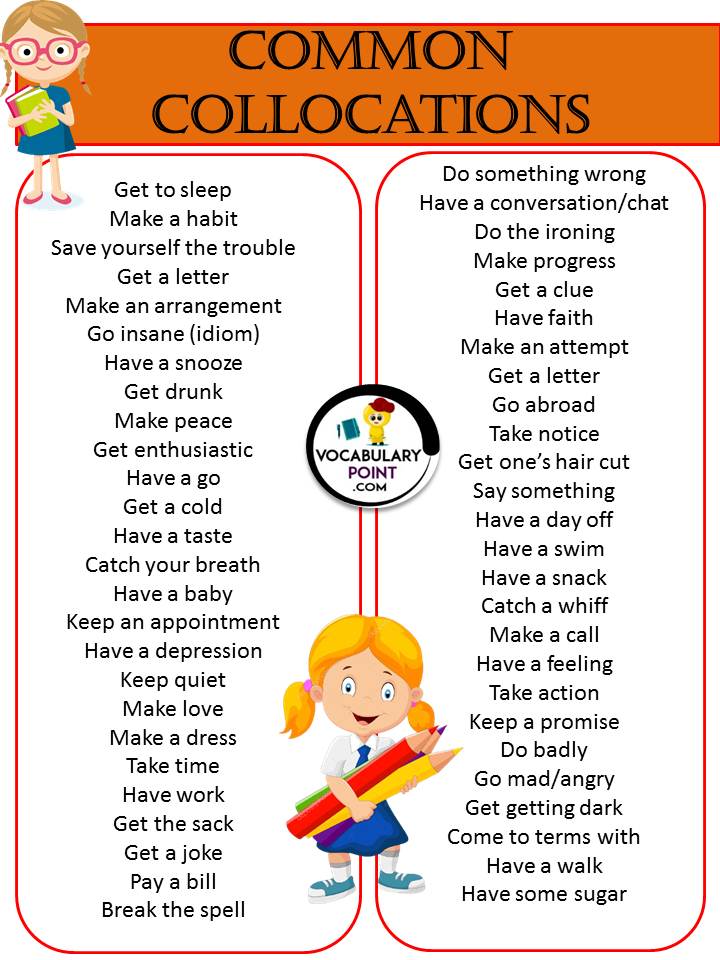
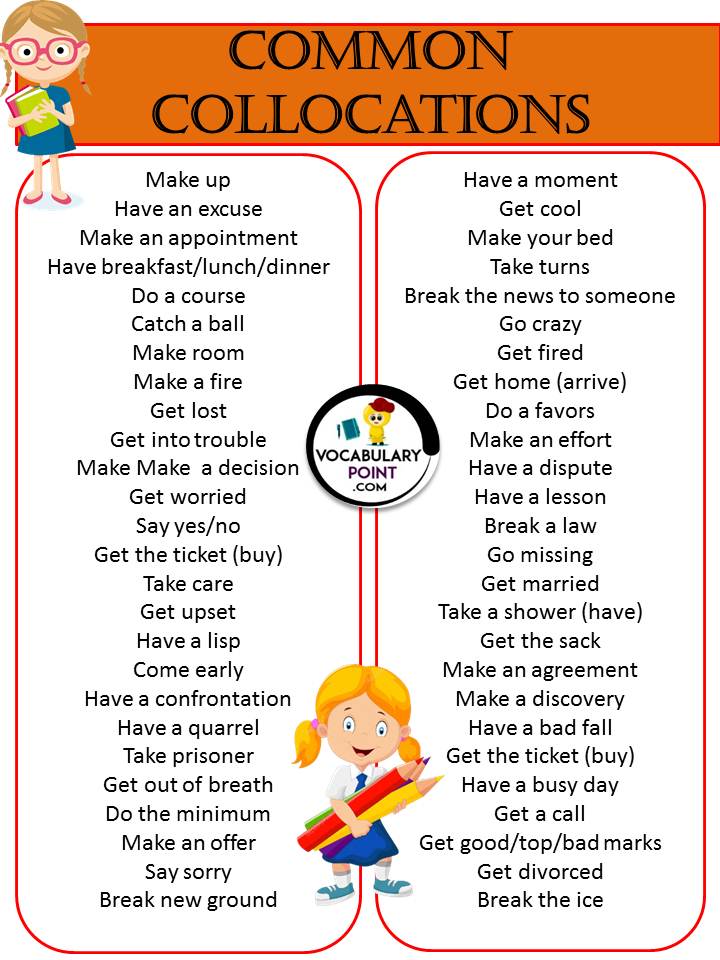


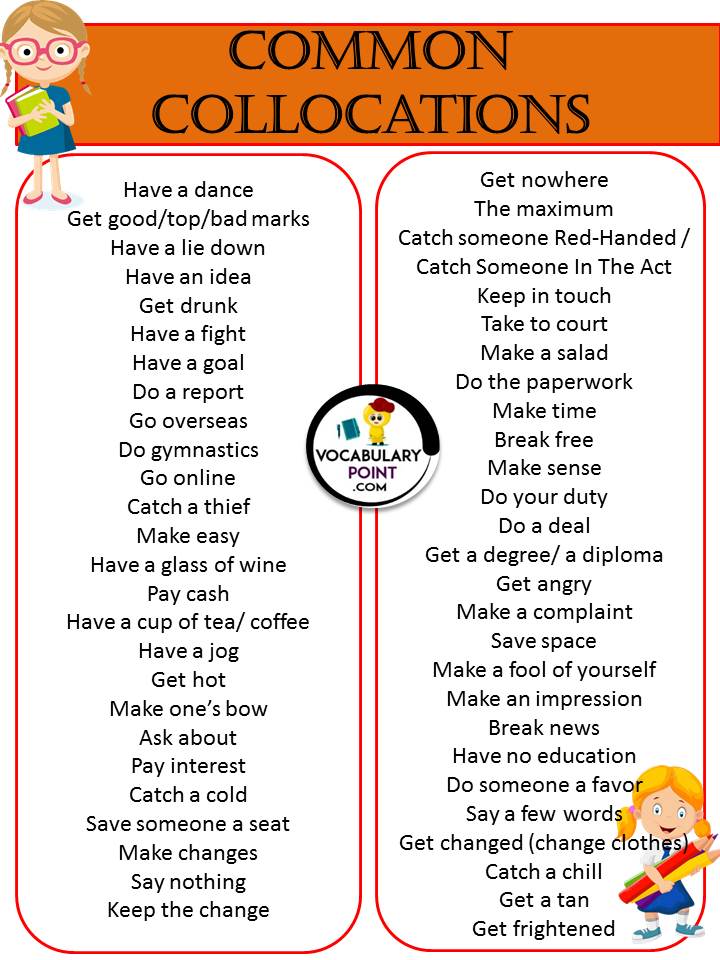
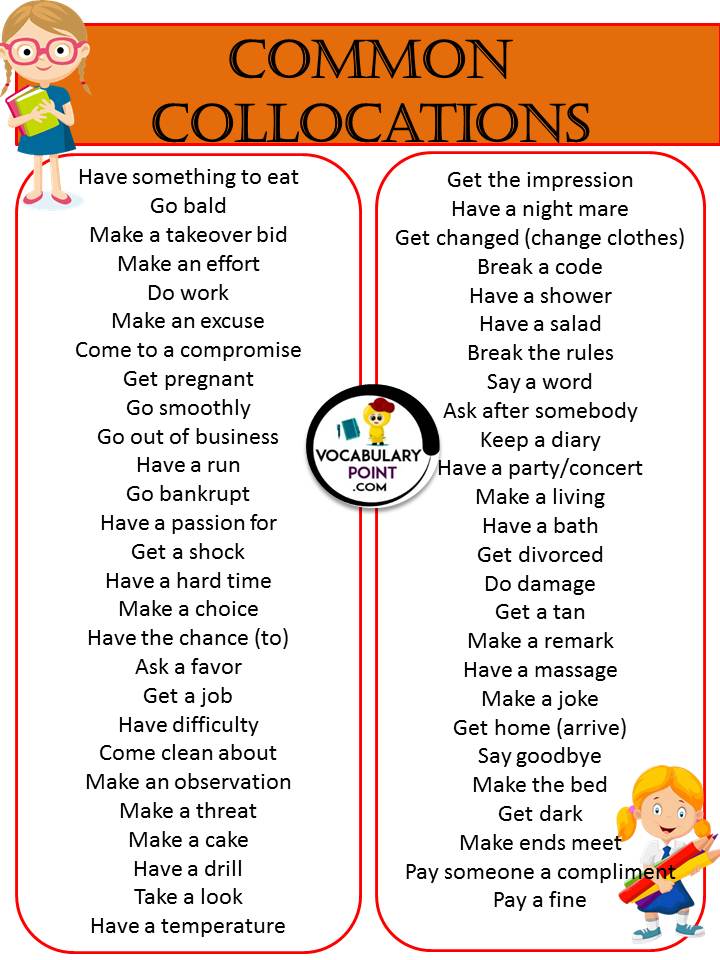
You can Download Common collocations in English
